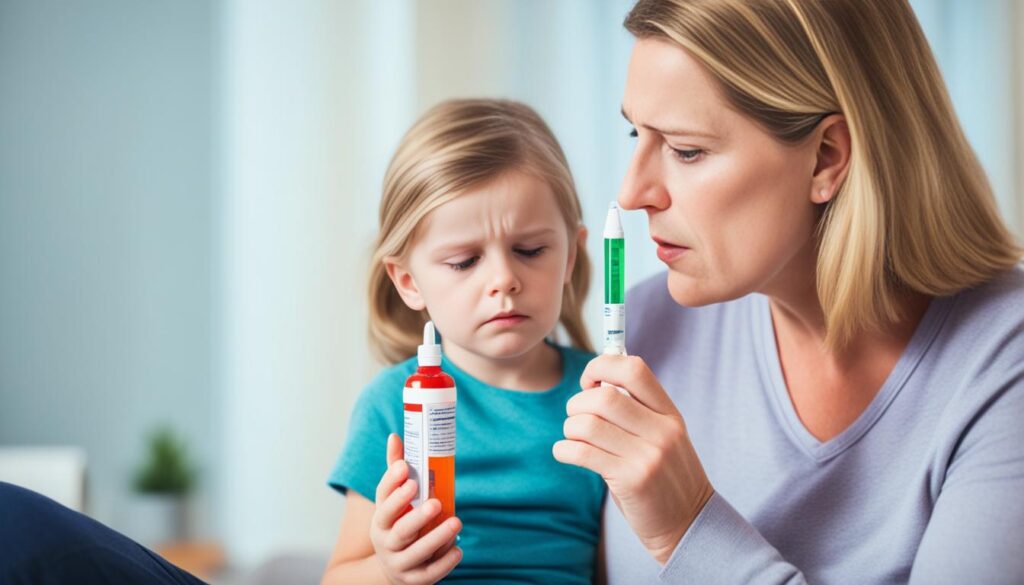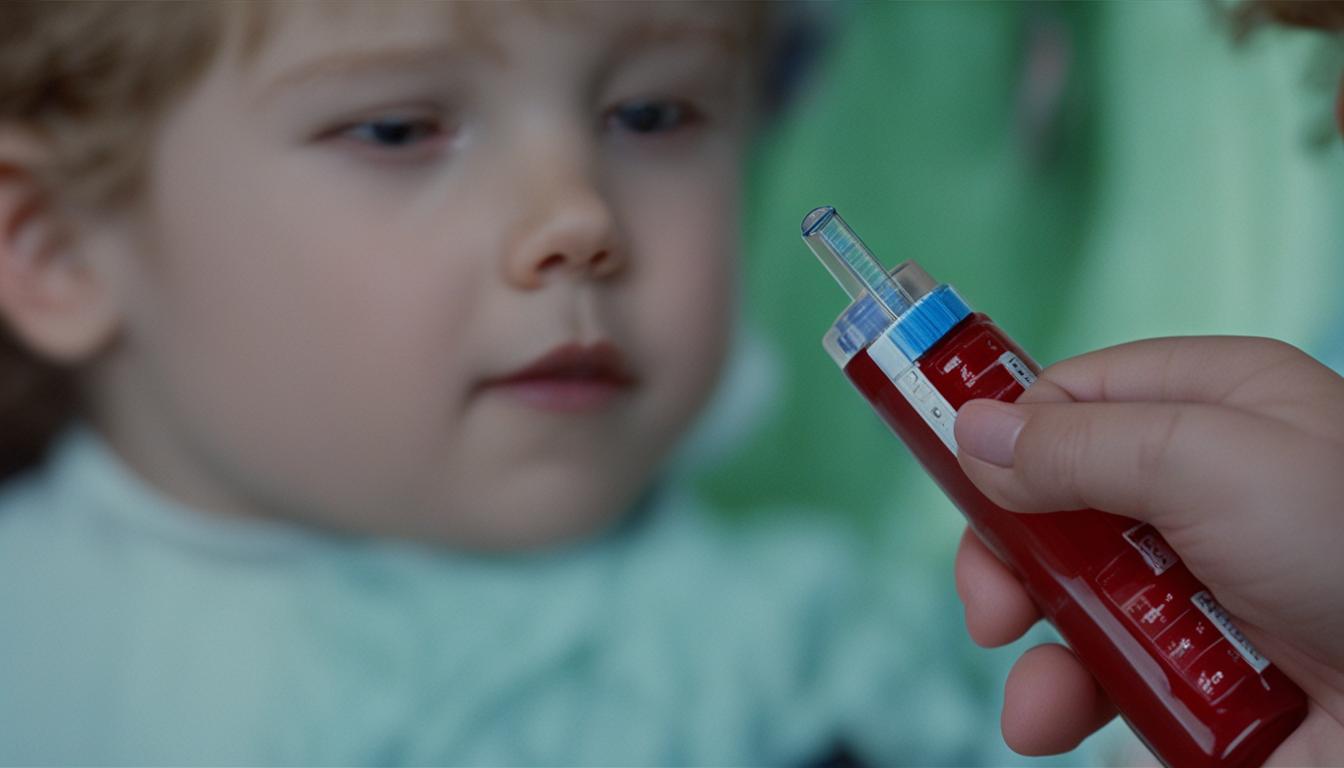Child Fever Relief: Ibuprofen Timing Explained
How long does ibuprofen take to work for fever in a child? When it comes to treating a fever in a child, timing is crucial. And that’s where ibuprofen comes into play. But do you know exactly when to administer ibuprofen for the best results? In this article, I will explain the optimal timing for ibuprofen administration to provide effective relief for your child’s fever.
Key Takeaways:
- Administering ibuprofen at the right time can help reduce your child’s fever.
- For infants aged 6-24 months with a rectal temperature above 102°F (38.9°C), ibuprofen can be given along with acetaminophen to help reduce the fever.
- Ibuprofen can be given every 6-8 hours, but it’s important to read the label carefully for proper dosage.
- Infants under 6 months old should not be given ibuprofen.
- If the fever persists or lasts longer than one day, it’s recommended to consult a doctor.
Understanding Fever in Children
Fever is a common sign of illness in children, often caused by infections such as colds, ear infections, and urinary tract infections. According to the Mayo Clinic, a fever is generally considered when the body temperature exceeds 100.4°F (38°C).
While fever itself can help the body fight off infections, it can also be uncomfortable for children. In such cases, children’s fever medication like ibuprofen can be used to provide relief.
It’s important to follow the proper dosage instructions and consult a healthcare provider if fever persists or is accompanied by other symptoms.
Did you know?
According to a study published in the Journal of Pediatrics, children experiencing fever often have an increased heart rate. Therefore, using fever medication to bring down the temperature can not only provide relief but also help stabilize the heart rate.
Fever Reduction in Kids
When it comes to reducing fever in kids, children’s fever medication can play a significant role. Ibuprofen, for example, is a widely used option for fever relief in children. It works by reducing the production of certain chemicals in the body that cause inflammation and contribute to fever.
It’s important to remember that fever is a natural response of the body to fight off infections, so medication should be used to provide comfort to the child rather than solely focusing on reducing the temperature.
Fever Remedies for Children
In addition to using children’s fever medication like ibuprofen, there are other remedies that can help provide relief to children with fever:
- Ensuring the child gets plenty of rest
- Encouraging them to drink fluids to stay hydrated
- Dressing them in lightweight and breathable clothing
- Using a cool compress on their forehead or back of the neck to help lower the temperature
When to Seek Medical Attention
While fever in children is often a normal response to illness, there are situations where medical attention should be sought. According to the American Academy of Pediatrics, you should consult a healthcare provider if:
- The child is under 3 months of age and has a rectal temperature of 100.4°F (38°C) or higher
- The child is between 3 months and 3 years old and has a rectal temperature of 102°F (38.9°C) or higher
- The child has a recurrent fever or the fever lasts longer than 24 to 48 hours
- The child shows signs of dehydration, such as decreased urination or excessive sleepiness
- The child has other symptoms that are concerning, such as a severe headache or difficulty breathing
Summary
Fever in children is a common occurrence and is often a sign of infection. While fever itself helps the body fight off illness, it can be uncomfortable for children. Children’s fever medication, such as ibuprofen, can provide relief when administered correctly.
It’s important to follow the proper dosage instructions and consult a healthcare provider if fever persists or is accompanied by other concerning symptoms. In addition to medication, other remedies such as rest, hydration, and appropriate clothing can also provide comfort to children with fever.
Ibuprofen Dosage for Child Fever
When it comes to providing relief for a child’s fever, it’s essential to understand the correct dosage of ibuprofen. The dosage may vary depending on the child’s age and weight. According to the Mayo Clinic, children aged 6 months or older can be given ibuprofen alongside acetaminophen for fever relief.
The recommended dosage should be carefully determined based on the child’s weight, and it is crucial to follow the label instructions precisely. By doing so, you can ensure that the child receives the appropriate amount of medication for their fever.
It’s important to note that exceeding the recommended maximum number of doses in 24 hours should be avoided. Following the proper dosage guidelines will help prevent any potential side effects and maintain the child’s safety and well-being.
If the fever persists or lasts longer than three days, it is advisable to consult a healthcare provider. They can provide further guidance and ensure the child receives the necessary care.
Providing the correct dosage of ibuprofen is crucial for managing a child’s fever effectively and ensuring their comfort.
The Role of Fever in Fighting Infections
Fever is a natural response of the body to infections and plays a crucial role in fighting off illness. When a child’s body detects the presence of bacteria or viruses, it elevates its temperature in an attempt to create an unfavorable environment for the invading pathogens.
The body’s immune system is activated by fever, enhancing its ability to combat infections. Increased body temperature stimulates the production of more white blood cells, which are responsible for fighting off harmful microorganisms. Additionally, fever hinders the growth and reproduction of bacteria and viruses, limiting their spread within the body.
While fever can be uncomfortable for children, it’s essential to understand that it is a natural defense mechanism and generally not harmful. In fact, moderate fever can aid the body in overcoming infections more quickly. However, if the child is experiencing significant discomfort or the fever is accompanied by other concerning symptoms, it may be appropriate to administer fever medication such as ibuprofen.
“Fever is a powerful ally in fighting infections. It helps activate the body’s immune system and create an unfavorable environment for bacteria and viruses to thrive.”
How Fever Medication Can Help
Administering fever medication such as ibuprofen can provide relief for a child experiencing discomfort due to a fever. Ibuprofen, a nonsteroidal anti-inflammatory drug (NSAID), works by reducing inflammation in the body, which can help alleviate symptoms associated with fever.
When using ibuprofen for fever treatment in children, it’s important to follow the recommended dosage based on the child’s age and weight. This ensures the medication’s effectiveness and minimizes the risk of potential side effects.
Table: Comparing Common Fever Medications
| Medication | Active Ingredient | Recommended Age | Dosage |
|---|---|---|---|
| Ibuprofen | Ibuprofen | 6 months and older | Refer to the label instructions for proper dosage based on the child’s weight and age. Avoid exceeding the maximum number of doses in 24 hours. |
| Acetaminophen | Acetaminophen | 2 weeks and older | Refer to the label instructions for proper dosage based on the child’s weight. Avoid exceeding the maximum number of doses in 24 hours. |
It’s worth noting that fever medication should not be the sole focus of treatment and should be used in conjunction with other measures, such as rest, hydration, and monitoring for any worsening symptoms. If the fever persists or is accompanied by concerning signs, it’s essential to consult a healthcare provider for further evaluation and guidance.
When to Seek Medical Attention

While most fevers in children can be treated at home, there are certain situations where medical attention should be sought. If an infant aged 3 months or younger has a rectal temperature of 100.4°F (38°C) or higher, or if a child between 3 months and 3 years has a rectal temperature of 102°F (38.9°C) or higher, it is recommended to consult a healthcare provider.
Additionally, other signs that warrant medical attention include an accompanying rash, recurrent fevers for more than seven days, or the presence of a chronic medical condition. Seeking medical guidance is crucial in these cases to ensure proper diagnosis and treatment for your child’s well-being.
Remember, always follow the guidance of a healthcare provider when determining the best course of action for your child’s fever treatment.
| Situation | When to Seek Medical Attention |
|---|---|
| Infant aged 3 months or younger | Rectal temperature of 100.4°F (38°C) or higher |
| Child between 3 months and 3 years | Rectal temperature of 102°F (38.9°C) or higher |
| Accompanying rash | Medical attention recommended |
| Recurrent fevers for more than seven days | Seek medical guidance |
| Presence of a chronic medical condition | Consult a healthcare provider |
The Benefits of Using Ibuprofen for Fever
Ibuprofen can be an effective medication for reducing fever in children. According to a study mentioned in a second source, using both acetaminophen and ibuprofen together has been shown to provide additional time without fever in the first 4 hours, compared to using acetaminophen alone. Additionally, the combination of both medications can clear the fever faster than using acetaminophen alone. However, it is crucial to carefully follow the recommended dosage and avoid exceeding the maximum number of doses in 24 hours.
When it comes to fever relief in children, ibuprofen offers several benefits. Not only does it help to reduce fever, but it can also provide additional time without fever compared to using acetaminophen alone. By combining both medications, caregivers can help ease their child’s discomfort and speed up the recovery process.
An important study highlighted the effectiveness of using both acetaminophen and ibuprofen together in reducing fever. The research showed that this combination resulted in more time without fever in the first 4 hours, compared to using only acetaminophen. Additionally, the combination therapy cleared the fever faster than using acetaminophen alone. This presents a valuable option for parents and caregivers looking for efficient and effective fever relief for their children.
However, it’s vital to remember that proper dosage and administration are paramount when using ibuprofen for fever in children. Following the recommended dosage guidelines and avoiding exceeding the maximum number of doses in 24 hours is essential to ensure the medication’s safety and effectiveness.
Advantages of Ibuprofen for Fever Relief:
- Reduces fever
- Provides additional time without fever compared to using acetaminophen alone
- Clears fever faster when used in combination with acetaminophen
“Using both acetaminophen and ibuprofen together can offer more effective fever relief and greater comfort for children.”
Choosing Between Acetaminophen and Ibuprofen
When it comes to treating fever in children, the choice between acetaminophen and ibuprofen is an important decision for parents. Both medications have the ability to effectively reduce fever, but there are some factors to consider when making this choice.
Ibuprofen, according to the Mayo Clinic, may be the preferred option for treating fever in children, especially if the child is uncomfortable. This medication can provide relief from discomfort and help reduce fever effectively. However, it’s crucial to follow the recommended dosage instructions to ensure the child’s safety and well-being.
It’s also important to note that both acetaminophen and ibuprofen should not be given together unless explicitly instructed by a healthcare professional. It’s essential to adhere to the recommended maximum number of doses in 24 hours to avoid potential side effects.
Ultimately, the choice between acetaminophen and ibuprofen should be made based on the child’s specific needs and symptoms. It’s advisable to consult a healthcare provider for personalized guidance and recommendations.
| Acetaminophen | Ibuprofen |
|---|---|
| Effective fever reducer | Effective fever reducer |
| Can be used for pain relief | Can be used for pain relief |
| Suitable for infants and children of all ages | Not recommended for infants under 6 months old |
| Can be given every 4-6 hours | Can be given every 6-8 hours |
| Always follow the recommended dosage instructions and consult a healthcare professional for personalized guidance. | |
Proper Administration of Ibuprofen for Fever

When it comes to providing fever relief to a child, proper administration of ibuprofen is crucial. Following the recommended guidelines ensures safe and effective treatment. According to the Mayo Clinic, ibuprofen can be given every 6-8 hours, depending on the child’s age and weight. It’s important to read the label carefully for the recommended dosage based on the child’s weight and age.
Key points to remember:
- Administer ibuprofen every 6-8 hours as directed
- Consult the label for the recommended dosage based on the child’s weight and age
- Avoid giving multiple medications containing acetaminophen to prevent accidental overdose
Proper administration of ibuprofen helps ensure that the child receives the appropriate amount of medication for fever relief. If you have any concerns or questions about the proper administration of ibuprofen, it’s best to consult a healthcare provider for guidance.
Safety Considerations for Ibuprofen Use in Children
When it comes to using ibuprofen for fever relief in children, it is crucial to prioritize safety and adhere to proper guidelines. The correct dosage of ibuprofen for child fever should be determined based on the child’s weight and age. Exceeding the recommended maximum number of doses in 24 hours can lead to potential side effects. It is essential for parents and caregivers to be vigilant about monitoring the child’s discomfort levels and any adverse effects.
If you have any concerns or questions regarding the safety of ibuprofen use in children, it is always best to consult a healthcare provider. They can provide personalized advice and address any specific considerations for your child.
Safety Tips for Using Ibuprofen in Children:
- Always follow the recommended dosage instructions based on the child’s weight and age.
- Avoid exceeding the maximum number of doses in 24 hours.
- Monitor the child’s discomfort levels and watch out for any adverse effects.
- Consult a healthcare provider if you have any concerns or questions.
“Safety is paramount when administering medication to children. Following the proper guidelines for ibuprofen use can help ensure their well-being and provide effective fever relief.”
In the next section, we will delve into the benefits of using ibuprofen for fever relief in children and explore how it compares to other medications.
| Advantages of Ibuprofen for Fever Relief in Children |
|---|
| Provides effective relief from fever in children |
| Can be administered alongside acetaminophen for enhanced results |
| Helps alleviate discomfort caused by fever |
| Can assist in reducing fever duration |
Conclusion
In conclusion, ibuprofen is a reliable and effective fever treatment for children. When administering this medication, it is crucial to follow the recommended dosage based on the child’s weight and age. By doing so, ibuprofen can provide relief from fever and alleviate discomfort when used alongside acetaminophen.
However, it is important to emphasize the importance of consulting healthcare professionals and following their guidelines. If a child’s fever persists or is accompanied by concerning symptoms, seeking medical attention is always advisable. A healthcare provider will be able to offer appropriate guidance and determine the best course of action.
Remember, fever is a natural response of the body to fight off infections. While it can be uncomfortable for children, it is generally not harmful. If a child’s fever can be managed at home with proper medication and care, it can help them recover and support their immune system.
FAQ
How long does ibuprofen take to work for fever in a child?
The timing of ibuprofen administration for fever relief in a child can vary. It can start to work within 30 minutes to an hour, but it may take longer for the fever to completely subside.
Can ibuprofen be used for reducing fever in a child?
Yes, ibuprofen can be used as a medication to help reduce fever in a child. However, it’s important to follow the recommended dosage based on the child’s weight and age.
What is the recommended dosage of ibuprofen for child fever?
The recommended dosage of ibuprofen for child fever should be carefully determined based on the child’s weight and age. It’s crucial to read the label instructions and not exceed the maximum number of doses in 24 hours.
What is the role of fever in fighting infections?
Fever plays a crucial role in the body’s immune response to infections. It helps activate the immune system and hinders the growth and reproduction of bacteria and viruses.
When should I seek medical attention for my child’s fever?
It’s recommended to consult a healthcare provider if an infant aged 3 months or younger has a rectal temperature of 100.4°F (38°C) or higher, or if a child between 3 months and 3 years has a rectal temperature of 102°F (38.9°C) or higher. Other signs that warrant medical attention include an accompanying rash, recurrent fevers for more than seven days, or the presence of a chronic medical condition.
What are the benefits of using ibuprofen for fever in children?
Ibuprofen can be an effective medication for reducing fever in children. According to a study, using both acetaminophen and ibuprofen together has been shown to provide additional time without fever in the first 4 hours, compared to using acetaminophen alone. Ibuprofen can also clear the fever faster than using acetaminophen alone.
How do I choose between acetaminophen and ibuprofen for fever treatment in children?
Both acetaminophen and ibuprofen can effectively reduce fever in children. Ibuprofen may be the first choice for treating fever, especially if the child is uncomfortable. It’s important to carefully follow the recommended dosage instructions and not exceed the maximum number of doses in 24 hours.
How do I administer ibuprofen properly for fever relief?
When administering ibuprofen to a child, it’s essential to follow the proper administration guidelines. Ibuprofen can be given every 6-8 hours, depending on the child’s age and weight. It’s crucial to read the label for the recommended dosage based on the child’s weight and age.
Is ibuprofen safe for fever relief in children?
Ibuprofen can be a safe and effective medication for fever relief in children when used correctly. It’s important to follow the recommended dosages based on the child’s weight and age and avoid exceeding the maximum number of doses in 24 hours. However, if there are any concerns or questions about the safety of ibuprofen use, it’s advisable to consult a healthcare provider.










